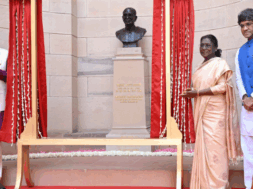
Manas Dasgupta
NEW DELHI, Sept 3: Giving an assurance to the Indian government that it was “committed to showcasing stories with authentic representation,” Netflix India on Tuesday said it had updated the opening disclaimer on its “IC-814: Kandahar Hijack” web series to include the hijackers’ both the real and code names to avoid any confusion by the viewers.
“For the benefit of audiences unfamiliar with the 1999 hijacking, the opening disclaimer has been updated… code names in the series now reflect those used during the event,” Monika Shergill, the OTT giant’s Vice President (Content, India), said.
“The code names in the series reflect those used during the actual event. India has a rich culture of storytelling — and we are committed to showcasing these stories and their authentic representation,” she said in a statement. Netflix India has also assured Centre that in the future, content would be in accordance with “nation’s sentiments.”
Ms Shergill’s comments came after her meeting with the Information and Broadcasting Secretary Sanjay Jaju in New Delhi. She was summoned by the ministry after concerns were raised in some quarters about various issues, including Hindu code names used by the hijackers and the alleged humane face given to some of them.
The OTT giant’s assurance comes at the back of a row involving its web series ‘IC 814 Kandahar Hijack.’ The series, which revisits the 1999 hijacking of an Indian Airlines flight by Pakistan-based terror outfit Harkat-ul-Mujahideen, has triggered a fierce backlash, culminating in an hour-long meeting between the streaming giant and the Centre.
Five hijackers took control of the plane which had taken off from Kathmandu to Delhi but the hijackers took it to Kandahar, Afghanistan, which was then ruled by the Taliban, after stopovers at Amritsar and Lahore. The government, then led by Prime Minister Atal Bihari Vajpayee, was forced to release three terrorists – Masood Azhar, Ahmed Omar Saeed Sheikh and Mushtaq Zargar – to secure the release of 154 hostages.
Directed by Anubhav Sinha and released on August 29, it portrays the hijackers of the ill-fated flight in a manner that has drawn ire from various quarters, particularly due to the alleged alteration of their names to “Bhola” and “Shankar,” traditionally associated with Lord Shiva. This depiction has been perceived as a distortion of historical facts, with critics arguing that it misrepresents the real identities of the terrorists, thereby offending Hindu sentiments.
In January 2000, the Union Home Ministry had revealed the real names of the five hijackers – Ibrahim Athar, Shahid Akhtar Sayed, Sunny Ahmed Qazi, Mistri Zahoor Ibrahim and Shakir. The ministry noted that during the hijacking and the hostage scenario they referred to each other by code names, two of which were ‘Bhola’ and ‘Shankar’. The others were ‘chief’, ‘doctor’, and ‘burger.’
Journalists who covered the hijacking live put out social media posts amid the controversy, saying that passengers had told them the hijackers had, in fact, used these names to address each other. But the protests led the Centre to summon Ms Shergill after the government took the stand that “nobody has the right to play with the Indian people’s sentiments.” Earlier in the day, Netflix India officials met government officials for over an hour, after which sources told NDTV the streaming service said future content will tally with those “sentiments.”
The release of ‘IC 814: The Kandahar Hijack’ has also ignited a war of words on social media. BJP IT Cell chief Amit Malviya accused the filmmakers of furthering an agenda to whitewash the crimes of Pakistani terrorists by giving them Hindu names, thereby misleading future generations. On the other side, former Jammu and Kashmir Chief Minister Omar Abdullah and Shiv Sena-UBT leader Priyanka Chaturvedi criticised the outrage as selective, pointing out the inconsistencies in demands for historical accuracy in cinema. The political spat aside there were demands on social media to boycott Netflix.














